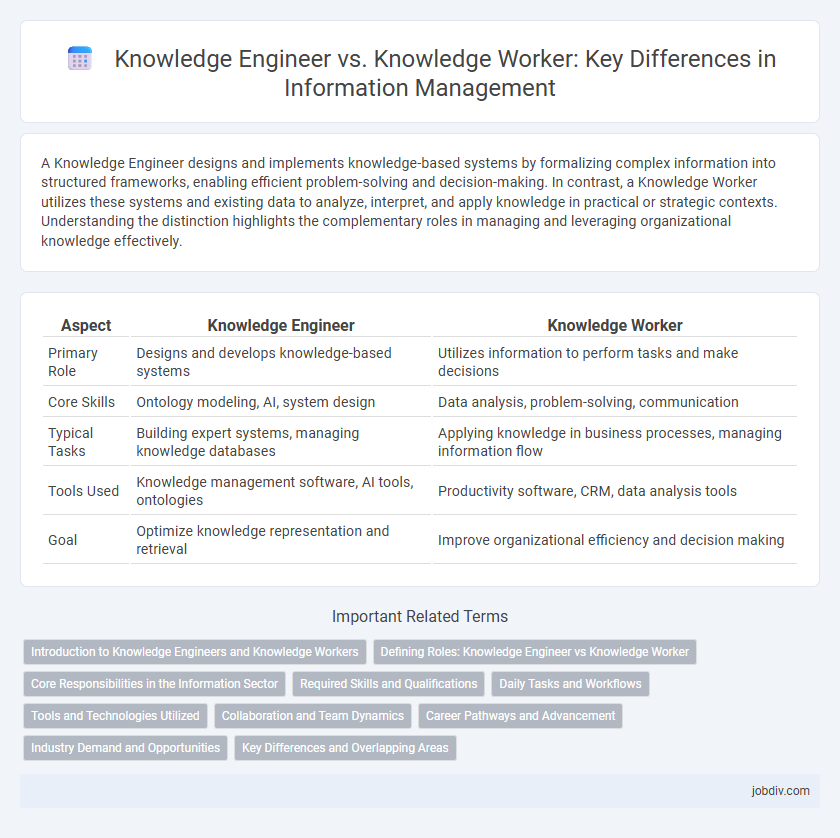A Knowledge Engineer designs and implements knowledge-based systems by formalizing complex information into structured frameworks, enabling efficient problem-solving and decision-making. In contrast, a Knowledge Worker utilizes these systems and existing data to analyze, interpret, and apply knowledge in practical or strategic contexts. Understanding the distinction highlights the complementary roles in managing and leveraging organizational knowledge effectively.
Table of Comparison
| Aspect | Knowledge Engineer | Knowledge Worker |
|---|---|---|
| Primary Role | Designs and develops knowledge-based systems | Utilizes information to perform tasks and make decisions |
| Core Skills | Ontology modeling, AI, system design | Data analysis, problem-solving, communication |
| Typical Tasks | Building expert systems, managing knowledge databases | Applying knowledge in business processes, managing information flow |
| Tools Used | Knowledge management software, AI tools, ontologies | Productivity software, CRM, data analysis tools |
| Goal | Optimize knowledge representation and retrieval | Improve organizational efficiency and decision making |
Introduction to Knowledge Engineers and Knowledge Workers
Knowledge engineers specialize in designing, creating, and maintaining knowledge-based systems that enable machines to process and apply complex information effectively. Knowledge workers utilize their expertise and critical thinking skills to analyze, interpret, and leverage information to solve problems and support decision-making within organizations. The role of knowledge engineers emphasizes system development and knowledge representation, while knowledge workers focus on applying knowledge to generate value and improve organizational performance.
Defining Roles: Knowledge Engineer vs Knowledge Worker
Knowledge engineers specialize in designing, developing, and maintaining knowledge-based systems by structuring and encoding complex information for artificial intelligence applications. Knowledge workers apply expertise and critical thinking to analyze, interpret, and utilize information in decision-making processes across various professional domains. The key distinction lies in the knowledge engineer's role in creating technological frameworks versus the knowledge worker's role in leveraging knowledge for practical outcomes.
Core Responsibilities in the Information Sector
Knowledge engineers design, develop, and maintain knowledge-based systems, ensuring the accurate representation and integration of information for effective decision-making. Knowledge workers analyze, interpret, and apply information to solve complex problems and support organizational goals through critical thinking and expertise. Both roles are essential in the information sector, with knowledge engineers focusing on system architecture and knowledge workers emphasizing practical application of data.
Required Skills and Qualifications
Knowledge engineers require advanced expertise in artificial intelligence, ontology modeling, and data structuring, often holding degrees in computer science or information systems. Knowledge workers, by contrast, need strong analytical abilities, communication skills, and domain-specific knowledge to process and apply information effectively, usually supported by professional experience or specialized training. Proficiency in tools like knowledge management systems is essential for knowledge engineers, while knowledge workers rely on collaborative platforms and critical thinking for decision-making.
Daily Tasks and Workflows
Knowledge engineers focus on designing, developing, and maintaining knowledge-based systems by creating ontologies, rules, and algorithms to structure and utilize information effectively. Knowledge workers engage in daily tasks involving information analysis, decision-making, problem-solving, and applying expertise to generate insights or develop strategies within their domain. Workflows for knowledge engineers emphasize technical system building and optimization, while knowledge workers follow cognitive processes centered on interpreting and leveraging information for organizational objectives.
Tools and Technologies Utilized
Knowledge engineers utilize advanced artificial intelligence tools, expert systems, and ontologies to design and manage knowledge bases, enabling automated reasoning and decision-making. In contrast, knowledge workers primarily rely on collaborative platforms, productivity software, and data analytics tools to process, interpret, and share information. The distinction lies in knowledge engineers developing the underlying knowledge frameworks, while knowledge workers apply these frameworks using user-friendly technologies for everyday problem-solving.
Collaboration and Team Dynamics
Knowledge engineers design and structure complex information systems to facilitate data integration, requiring close collaboration with subject matter experts and IT teams. Knowledge workers apply this structured knowledge to perform specialized tasks, relying heavily on clear communication and feedback loops within interdisciplinary teams. Effective collaboration between knowledge engineers and workers enhances team dynamics by aligning technical frameworks with practical workflows, boosting organizational productivity.
Career Pathways and Advancement
Knowledge engineers specialize in designing and implementing knowledge-based systems, often requiring expertise in artificial intelligence, data modeling, and software development, with career pathways leading to roles such as AI architect, systems analyst, or research scientist. Knowledge workers primarily focus on applying information, critical thinking, and expertise to solve business problems, with advancement opportunities in management, strategy, or specialized professional roles like business analyst or consultant. Both career paths emphasize continuous learning and adaptation to emerging technologies, but knowledge engineers typically advance through technical proficiency, while knowledge workers progress through domain expertise and leadership skills.
Industry Demand and Opportunities
Knowledge engineers specialize in designing and implementing knowledge-based systems, driving innovation in artificial intelligence and data management sectors with rising industry demand. Knowledge workers apply critical thinking and domain expertise to analyze information and solve problems, maintaining high demand in fields such as business analysis, consulting, and research. Both roles offer expanding opportunities due to increasing reliance on data-driven decision-making and intelligent automation across industries.
Key Differences and Overlapping Areas
Knowledge engineers design and maintain knowledge-based systems, applying expertise in artificial intelligence and cognitive computing to structure and encode information for automated reasoning. Knowledge workers use this information and knowledge systems to perform tasks requiring critical thinking, problem-solving, and decision-making within various professional domains. Both roles intersect in their reliance on knowledge management, but knowledge engineers focus on system development and optimization, while knowledge workers emphasize practical application and interpretation of knowledge.
Knowledge Engineer vs Knowledge Worker Infographic

 jobdiv.com
jobdiv.com